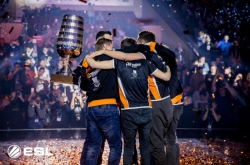Concept
“I got the idea for this project when I thought about how impossible it would be to get to play football with Cristiano Ronaldo. And then I thought how great it would be to play an online game with a professional cyberathlete. I added this idea to my personal list of interesting thoughts that come to my mind,” remembers Nikolai Golos, Master’s student at the Department of Computer Technology and Design.
Naturally, setting up a game with a professional cyberathlete is a lot easier than doing the same with a famous football player - all one needs is an Internet connection! Yet, the idea was shelved for about a year, up until Nikolai saw a post on ITMO’s community page in VK about Future Technologies accepting new residents. According to Nikolai, he was interested in launching his own project as his job at a major IT company limited his potential and hindered self-fulfillment.But he had no idea which project he would’ve liked to work on. And that is when he got the chance to use his list of ideas, among which he found the right one.
Some time before that, Nikolai and his friends already tried to launch a project. In essence, it was a special app for finding people who were interested in playing an active game at some sports-ground in the city. Nikolai presented the idea at several hackathons, but finally, he and his team realized that there’s no way to make money this way. Why?
First of all, the app’s target group was mostly schoolers who don’t have much money. Secondly, such an app may be popular in summer, but in winter the amount of users would drop. Finally, it turned out that there had already been many similar failed projects.

Funbo has no such drawbacks. Besides, there is no similar platform where a user can play with a professional cyberathlete. There are websites where cyberathletes train novices, or websites that help novice athletes find mentors - nowadays, one can make millions as a cyberathlete, and a great amoung of training is required to become one. You can read more about e-sports and being a cyberathlete in an interview with cyberathletes from ITMO University.
How it works
As of now, Funbo operates through a community in VK where users can sign up for a game with a professional cyberathlete, as well as see footage from previous games. The project also has a website. The team organizes games by themselves - they look for players, add them to their friends lists, set up chatrooms and moderate games. In future, they plan to automate the process using a dedicated platform.
“For now, it is most important to learn whether there is any real demand for the project, i.e. whether players are eager to pay for playing with cyberathletes, and whether cyberathletes are ready to play with regular gamers. For a start, we chose Dota 2, as I once played it myself, followed tournaments, so I know what cyber athletes there are. In future, we’re planning to develop our own platform, and add new game disciplines,” comments Nikolai Golos.
The team has already organized three games, in which 10 people participated. A compulsory condition for any athlete who’s been invited by the organizers is to communicate with other players via voice chat. At first, it is the organizers who hype up the players by commenting on the game or asking questions; gradually, everyone joins the conversation.

“Everything goes quite fun, the cyberathlete answers the player’s questions, like how his parents felt about him spending lots of time on games, for instance. Everyone is communicating as equals, the cyberathlete shares his experience, and the players like it. They also like it how cyberathletes show off their skills. For instance, once a cyberathlete asked the team whether they wanted him to kill a particular character that very instance. Everyone agreed, and in a couple of seconds the character was dead. Surely, the players were exuberant, and started to ask questions: how could he do it that fast? This way, we remove the barrier that exists between novice players and professionals. Funbo also unites the players into a community of like-minded people,” says Nikolai Golos.
As of now, the cost of one game with a cyber athlete is 150 rubles (less than 3 USD). At the very beginning of the project, its authors conducted a survey among gamers, asking them whether they are interested in such an opportunity and how much they would pay for it. The survey showed that some were ready to pay as much as 500 rubles for a game with a top-ranking cyber athlete. However, when Funbo organized its first game at this price, no one signed up and they had to do it for free. Nikolai notes that this might have happened because the cyberathlete they’d enlisted was not very high-profile. Still, they got the footage of a game that they could display in their community in VK, providing a sample to potential customers..
In future, Funbo’s developers plan to decide on the price of a game using an open auction. The cyberathlete will state the minimal price for a game per player, and gamers will have the opportunity to bid so as to get their place in the game. Of course, such a format will only become viable when the project attains a large enough audience.
Finding partners and making plans
At Future Technologies, the first advice to the Funbo team was to understand whether their project can be relevant at all. They created a survey and mailed it to members of Dota 2-centric communities in social networks. Their objective was to get at least 50 responses, which they attained in just a couple of days. It turned out than 80% of the respondents were interested in playing with a e-sports star, and 20% were ready to pay for it. The accelerator’s experts found these results assuring, and advised the team to launch the project.

In order to find their first clients, Funbo searched for the most committed fans of online games,using the SMM tool Segmento Target to identify several groups of potential clients. For instance, one of the groups included people who are subscribed to at least five communities on online gaming and actively comment on posts, while another included computer-club regulars. Then, the team launched targeted advertising in VK.
“At first, it was quite hard, as many users didn’t trust us. We had to add the cyberathletes we invited to our group’s contacts list. Still, when we got the first videos of our games, everything became much simpler. Also, we ask the those who played our games to fill out a survey with their impressions, and it’s great that many of them are ready to participate in our future games. We were afraid that gamers will soon forget about our project after trying it once. Yet many of them write to us that playing with a cyberathlete was the best game in their lives,” underlines Nikolai Golos.
Right now, the Funbo team works meticulously with every potential client and keeps a special database to which they add information on which gamers are ready to play which games, and whether they are up to playing for a second time. When a new game is organized, they notify every player who may be interested. Also, Funbo actively uses VK’s automated notifications service.

Another important part of Funbo’s development is the involvement of cyberathletes. In essence, the whole project depends on whether it is possible to persuade them to play with their fans. To find the first partners, the project’s team wrote directly to professional gamers. Many never replied, others were skeptical about the idea, but several agreed. In future, cyberathletes will understand that such games are a legitimate way make money, especially if there’s an auction for participating, say Funbo’s developers. Also, playing with fans is a great way to increase one’s popularity, which is also a good thing.
“At the business accelerator, we were assigned a mentor who had the experience of organizing e-sports tournaments. He advised us to come up with new business models and plans every week and test them. For instance, we hypothesized that gamers are ready to play with cyberathletes for 150 rubles. We checked it, and it was true. Our next objective is to increase the member count in our community. We plan to do that by attracting partners from different industries: for instance, some company may hold a raffle, and the prize will be a game organized by Funbo. This way, we make money, and our partner gets exposure. If everything goes fine, we’ll be aiming at the international market, as the audience there is less strapped for cash,” shares Nikolai Golos.
So far, Funbo continues to develop, and the project’s team is actively looking for new members. Nikolai adds that they invite everyone interested to join their startup.





